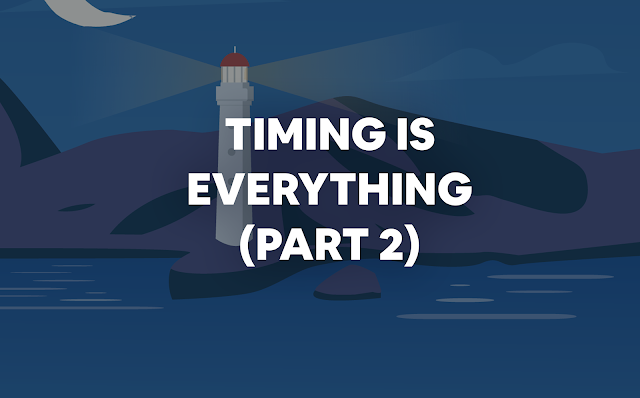Timing is Everything (Part 2)
All we want is to be in the right place at the right time. It’s all about having a good instinct for when the time is ripe to make a move. The proper timing is an important part of your career since it reduces friction and enables you to accomplish more in less time. In conclusion, timing is crucial to productivity and time management.
- 💩 Finding the right context
- 💩 Directly reducing blockers
- 💩 Be easily adaptable and align your goals with the environment
- 💩 Preparing enough resources
- 💩 Listening to yourself very carefully
1. Find the right context (by chance, easy), or create it (hard).
👍 Your friend got a sudden salary raise, so you ask for a raise – bad context.
👎 You feel emotionally numb working, so you decided to talk and share with someone about the pros/cons of pursuing your master's degree so that you won't make expensive mistakes – good context.
2. Directly reducing blockers (toward your goal).
 |
| This is my husband, Gojo Satoru dealing with his blockers. |
- Talk face-to-face with people who are blocking you and try to convince them of the greatness of your goals by listing their benefits
- Assuage any fears before making a change
- Make sure people understand your goals very clearly
- Smash any general negative opinions with arguments
- Look for better win-win situations
3. Be easily adaptable and align your goals with the environment.
Thus, the third rule of the right timing is to stay adaptable. To achieve your goals, you need to be smart enough to overcome different obstacles. By staying adaptable, you can influence the timing by:
- Waiting for better times
- Speeding things up to make sure the window of opportunity doesn’t close
- Changing the direction a lil bit/a lot
- Leaving goals behind and going after your 'Plan B' (deciding the timing will never be right)
4. Preparing enough resources.
Being prepared greatly influences whether or not the timing is right. Sorry to say 💩, but, really — if you don’t have enough resources on your side, then your timing is never right. Your resources can be internally or externally, but it’s best to prepare the right combination of both.
Your outer or 'external resources' are all the elements beneficial to you in terms of money 💵 (sigh, but money really can make phases of your life easier), connections (Kabel Besar), contracts, assets, and so on.
5. Listening to yourself very carefully (and strategize based on your surrounding).
TLDR; this part required you to read more individual development books 💁 hahaha.
Your timing is greatly determined by how you position your goals with new trends and societal patterns (cultured peep calls it paradigm) in the environment, which can be social, economic, political, etc. That factor might be even the greatest contributor to the right timing. Paying attention to what’s happening in the environment must always be part of your decision about timing ⏱, as understanding your environment is an important part of being opportunistically 'smart' and strategizing good decisions.
Changes can happen as an evolution (we mostly know where this thing will go) or revolution (eh, why so sudden one?). Evolutional changes are quite predictable. If you analyze the trends, paradigms and projected developments in different markets, you can get the idea of where an environment is developing. Part of hitting the right timing is to analyze and understand these changes.
Revolutionary changes are much harder. They are impossible to predict, they happen suddenly, and they present great threats as well as great opportunities. When a revolutionary shift happens, new winners go up and many previously successful people fall to the bottom. You must always be on alert for revolutionary changes.
Stay alert. If you sense such a change before everybody else, you can hit the right timing in a very big way. OK 👌
Wait. How do you know if your timing is bad?
Acting without thinking (and considering the timing) – The first big mistake you can do is not to pay attention to the timing at all. In 95% of cases (ya, I'm bluffing), when you act impulsively, the timing is wrong. You may get lucky from time to time🤞, but that isn’t even close to enough for you to be really successful in the long term. You want to be smart, not just lucky.
Faking it in the hopes of making it – You need to know there is absolutely never the perfect timing for anything, but there is a big difference between making a smart move and taking a smart risk, or making a stupid decision. If you feel deep down that the your time is not right yet and you’re only trying to fake it until you make it without enough resources, strategy, and commitment, you are only going to hurt yourself 😩.
Doing things based on the wrong assumptions – The next mistake you can do is to go against the markets and other environmental forces based on the wrong assumptions. Incorrect assumptions are the origin of all screw-ups ☠️, that includes assuming that the timing is right when it’s not (sigh 😞). When you are trying to do something different than the majority (or trying to reinvent the wheel), you need to have real proven data to validate your so-called instinct, and superior insights to hit the right timing. So tell me - do you have superior insights that backup the move you are about to execute?
Bad effort-risk-reward ratio – Lastly, your timing is 100% wrong if there is no justifiable effort-risk-reward factor. Effort is needed to score any goal, and there'll be always some risk that you will fail and lose resources. You want to find chances where the risk is low ⬇️, the effort is optimal ↔️, and the reward is huge ⬆️, which means hitting the right timing. If the ratios feel off, you should definitely wait for better timing or rethink your strategy.
OK. Thanks.





